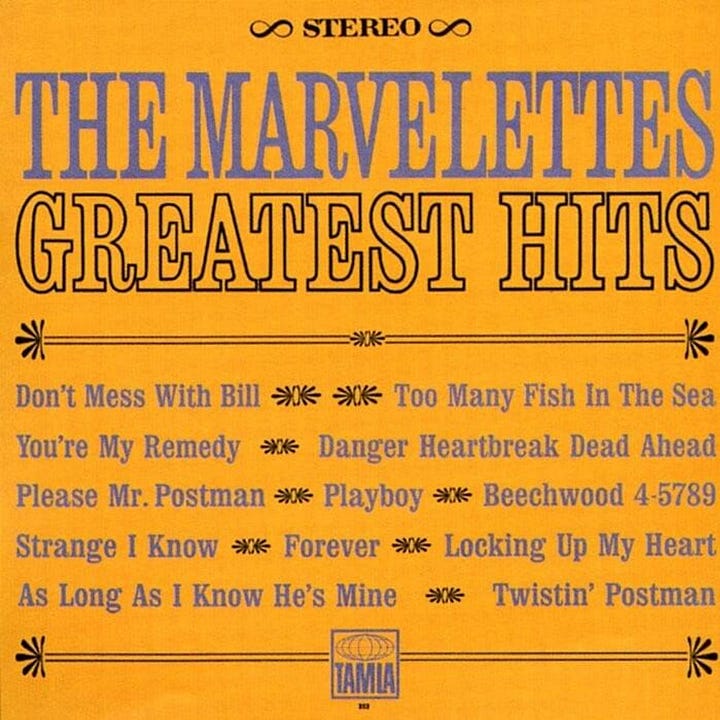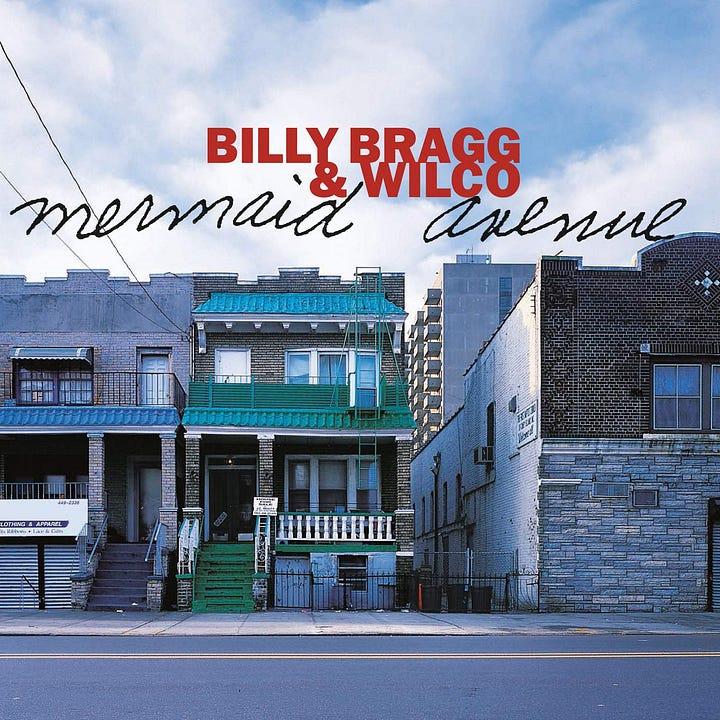Xgau Sez: November, 2023
Therapy, the Vandellas vs. the Supremes vs. the Marvelettes, Wilco (The Reviews), the listening method, the Kennedys then and now, and Pazz & Jop motivations.


Have you ever done psychiatric or psychological therapy? Do you perceive the ongoing concern for mental health and well-being with some degree of generational skepticism and distance or is it a welcome change from what I perceive may have been a diminished interest in the topic during your youth? Would you rather there be more political interest in today’s artists (not that they’re mutually exclusive), could “mental health” be code for selfishness or is that too cynical a view? Am I simply ignoring the fact that it’s nothing new and you saw it being dealt with lots back in the day? — David, Calgary, Alberta
I don’t know enough young people to comment on how much therapy they do except to wonder how they pay for it. Maybe things are different in socialized Canada, but here in NYC it can cost plenty. That said, I know plenty of people who’ve done therapy, count one therapist an old friend, and have written about my own experiences with therapy in Going Into the City. One shrink played a minor but key role in my decision to set my sights on a relationship with none other than Carola Dibbell, while another was in our lives when Carola and I had a crisis in 1980 and certainly did me more good than the marriage counselor we consulted did the two of us. Then again, the NYU-linked therapist Carola consulted for free in the early ‘70s was such a key figure in her life that he’s the focus of her strange, poignant, funny, highly recommended short story “Surviving Death.” Carola gets free counseling as part of her so far successful treatment for multiple myeloma and also consults a therapist who specializes in counseling writers who gets a thank you she deserves in the acknowledgments to The Only Ones.
Hello Mr. Christgau, I recently checked out Martha & the Vandellas’ The Definitive Collection and had my mind blown by the extended mix of “Heat Wave,” where the Vandellas’ feverish “burning, burning, burning” cheers Martha on as she pushes the song into a new emotional peak. After that I looked into their history more and found after Motown shifted its focus and resources to Diana Ross (and the Supremes) they seemed to stop getting material from its first-string songwriters/production teams; at least the Marvelettes had Smokey Robinson writing a few more indelible classics for them. And while the Supremes were commercially irrefutable, I couldn’t help but think with the same support and resources they got Martha or The Marvelettes could’ve done just as well, what do you make of this? — Clement Lin, China
I do not own The Definitive Collection but wasn’t wildly impressed by the not-all-that-extended “Heat Wave” when I found it on Spotify, which is too bad because Carola adores “Heat Wave,” which appeared around when she was beginning her sophomore year in college and—along with the Beatles, natch—reconverted her to rock and roll. (She had a jazz phase that has served her well for decades without cutting into her rock and roll fandom. When I asked whether it wasn’t maybe “Dancing in the Streets” that so impressed her she stuck with “Heat Wave.” “It’s my favorite song,” she said indignantly. “It’s everybody’s favorite song.”) Me, I’m not such a big Reeves fan, partly because while finally purchasing a couple of LPs I adore to this day I also bought her Dance Party, which definitely didn’t hold up against The Beatles’ Second Album or The Rolling Stones Now. Not only that, but my fave ‘60s ur-Motown album is The Marvelettes’ Greatest Hits, purchased in 1969 or maybe 1971, I still remember finding it in a bin in Berkeley. Motownwise, Reeves got the shaft as the Supremes took over the label, not least because she was bizwise enough to nurture big ambitions that sat poorly with Berry Gordy, who was more bizwise by a considerable margin. In my view her voice was just big enough to justify dreams of taking her pop legit. By the time I was getting records in the mail I recall getting a solo debut from here, maybe the Richard Perry production Nelson George references in his Motown book Where Did Our Love Go? For sure she had a bigger voice than Diana Ross or Gladys Horton of the Marvelettes, but that’s never enough. The album was a dog.
I’ve read your reviews of Wilco and I find them completely mystifying. Disagreeing with your reviews is familiar territory for me. But I usually (almost always) think you have interesting things to say about interesting music. But reading what you wrote about Wilco makes me wonder if you accidentally listened to and reviewed the wrong music. Did you accidentally swap your Bright Eyes disks into Wilco jackets? The best Wilco album is up for debate, but Wilco (The Album) is not it, and that’s not debatable. My vote would be Summerteeth, but I wouldn’t argue with anyone who said YHF, Ghost, or Sky Blue Sky, each of which you dismissed so lazily I can’t believe you actually listened to them. My question is, how did you get your Wilco reviews so spectacularly and colossally wrong? — Matt Petersen, Earth
One of the more depressing things about spending your life as a critic is haters who should probably avoid criticism because disagreement sits so poorly with them. Many of these people are just stupid, but Petersen doesn’t seem to be—his syntax is fine, and sometimes he thinks I’m “interesting.” He just loves Wilco so much that the fact that a name critic doesn’t share his full-bore enthusiasm drives him mad. You’d think to read this aggrieved fan’s hate mail that I’d panned all of Wilco’s albums when in fact only one of my nine repeat nine reviews is negative. The problem with the others, presumably, is that they’re not positive enough—one A minus, two B plusses, three three-star Honorable Mentions, one two-star, one one-star. In addition they collaborated on an album I love, the Billy Bragg-enhanced not to say -dominated Woody Guthrie tribute Mermaid Avenue. But going back to Uncle Tupelo I’ve always thought Tweedy was overrated as both a singer and a songwriter and explained why in prose I can guarantee wasn’t “lazy” because I know how hard it is for me to put sentences together.
When you're listening to an album, what do you do? Do you sit there and take it all in, or do you do something else while it's playing? Personally, I usually have to be doing something else, but I have noticed I get a better connection with the songs if I lay in bed and listen to it. — Ray, Atlanta
My basic method is the one I’ve used since I started listening to the radio in my own room when I was 12: have music playing all the time and see what attracts your attention. By “all the time” I mean something less absolute, of course—only when I’ve lived alone has it been literal, and from the beginning there was often baseball vying for my attention, and seldom did I do both at once. But all the preceding assumes I’m living alone when for the past half century I’ve cohabited with a woman who I’m forever milking for offhand opinions. If she likes it I almost certainly do or will. But that only happens when she’s not working herself—more often we have to negotiate so she’s not distracted by my sounds, and for years she got to rent her own work space in a friend’s apartment upstairs (which she still misses). All that said, absolutely once I’ve determined that a record pleases me on a casual basis I hone in on it, generally playing it five or 10 times and making sure I catch every lyric. I don’t think the kind of listening many fans do requires that kind of attention. But if the music is to your taste it will repay it.
This is something that has been bugging me a long time. I’m 62. JFK was assassinated when I was two. RFK was assassinated when I was seven. I have no memories of either. But the media is still fascinated by the Kennedy mystique. And most of them are far younger than I am. I remember vividly Tom Brokaw commenting after Al Gore’s acceptance speech in L.A. in 2000 that he was no JFK. It infuriates me to this day. With RFK, Jr., do people, younger than I am, still hold to the Kennedy “mystique”? Is this a media myth? Or am I missing something? — Theodore Raikin, Metuchen, New Jersey
JFK became president by barely defeating Richard Nixon, who even in 1960 seemed like the amoral menace his eventual presidency proved him to be. Kennedy’s never fully explicated assassination suggested that despite the Bay of Pigs disaster he was regarded as a dangerous agent of change by the forces of evil, plus he projected a youthful vigor and gathered an impressive liberal brain trust around him. Hence his legend, which while it wasn’t justified by his actual achievements as of November 1963 is rightly associated with what LBJ soon accomplished as his de facto political heir, in particular the Civil Rights Act and then Medicare. True, Vietnam took root on JFK’s watch as well, and while I suspect he would have done better with it than LBJ, how much better cannot be known. That said, though, RFK did become genuinely antiwar, which to me indicates that JFK would probably have taken a less hawkish path though who can know for sure? What is clear is that RFK’s own antiwar feelings were genuine. Without having the expertise to vouch for its unconventional details, I recommend the “investigative poetry” of Ed Sanders’s Broken Glory: The Final Years of Robert F. Kennedy (which also has plenty of alarming stuff on the MLK assassination). RFK Jr., however is clearly a menace and has been since he went on the Covid-period anti-vax crusade many other Kennedys have condemned.
What was your motivation for starting the Pazz & Jop poll? — Michelle, Chicago
My main motivation was to establish a critical consensus like any other critics’ poll. Not that such a consensus is definitive, but it’s certainly informative as regards both the critics and the art form they cover, plus it was a standard journalistic circulation-booster that filled a gap left by the departure of a mag called Jazz & Pop, and clearly that gap needed filling. In addition I thought that, as with “Dean of American Rock Critics,” Pazz & Jop was a handle that might attract some attention on its own. A hook, we call that in the music biz. Like the blatantly obvious “Consumer Guide,” this one definitely worked.




